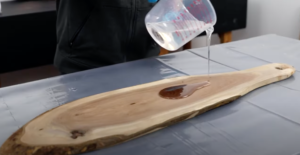Mothers Concerned With Food Safe Clear Coats- Epoxy
Mothers concerned about using food-grade clear coats, such as epoxy resin, often focus on the health and safety implications of these products. Although food-grade epoxy resins are specifically designed to be safe for contact with food once fully cured, several considerations remain important. One primary concern is the potential for chemical exposure during application. While these resins are safe once cured, the fumes released during mixing and application can be harmful if inhaled, and direct skin contact can lead to irritation or allergic reactions. To mitigate these risks, it’s essential to ensure that the application area is well-ventilated and that protective gear, such as gloves and masks, is used.
Proper Pouring Is Key To Success
Another concern is the proper curing of the resin. Food-grade epoxy needs ample time to fully cure before any food contact occurs, as the resin might release residual chemicals during the curing process. Therefore, ensuring that the resin is completely cured and that the workspace remains free of contamination is crucial. Additionally, there is the issue of residue and proper cleaning; any leftover resin and cleaning materials must be disposed of according to safety guidelines to prevent environmental and health hazards.
Is Epoxy Really Safe For Food Contact?
Moreover, while food grade clear coat are designed to be safe for use in contact with food, there is always a need for vigilance in following manufacturer guidelines and safety data sheets. For mothers, especially those with young children, taking these precautions helps ensure that the materials used in food-related projects do not pose health risks and that their environment remains safe. Proper education and adherence to safety practices are key in addressing these concerns effectively.
How to Properly Clean
Cleaning food-grade epoxy resin properly is crucial to ensure it remains safe for use, particularly in applications where it will come into contact with food. Here’s a step-by-step guide to cleaning food-grade epoxy resin:
1. Gather Supplies:
- Cleaning Solution: Use a mild detergent or soap mixed with water. For tougher residues, isopropyl alcohol or a dedicated epoxy resin cleaner may be used.
- Soft Cloths or Sponges: Non-abrasive cloths or sponges will help avoid scratching the epoxy surface.
- Warm Water: Helps dissolve residues and makes cleaning more effective.
- Rubber Gloves: Protect your hands from any potential irritation.
2. Initial Wipe Down:
- If the epoxy is still wet, gently wipe away any excess resin with a clean, dry cloth or paper towel to prevent it from setting and becoming more difficult to clean.
3. Apply Cleaning Solution:
- Mix a small amount of mild detergent or soap with warm water. Dip a soft cloth or sponge into the soapy water and gently clean the epoxy surface. For surfaces with more stubborn residues, you can use isopropyl alcohol or an epoxy cleaner according to the manufacturer’s instructions.
4. Scrub Gently:
- Use a soft, non-abrasive sponge or cloth to scrub the epoxy surface gently. Avoid using abrasive scrubbers or harsh chemicals, as these can damage the resin’s surface and potentially make it unsafe for food contact.
5. Rinse Thoroughly:
- Rinse the epoxy surface with clean, warm water to remove any soap or cleaning solution residue. Ensure that all cleaning agents are thoroughly washed off, as residual chemicals can affect the safety of the epoxy, especially if it will be used in food-related applications.
6. Dry the Surface:
- Dry the cleaned epoxy surface with a clean, dry cloth. Ensure it is completely dry before using or applying additional coatings. This helps prevent any moisture from compromising the epoxy’s integrity or safety.
7. Inspect the Surface:
- After cleaning and drying, inspect the epoxy surface for any remaining residues or signs of damage. If any areas still have residue or appear compromised, clean again or consider reapplying a fresh coat of food-grade epoxy if necessary.
8. Regular Maintenance:
- For surfaces that come into regular contact with food, periodic cleaning and inspection are important to maintain safety and cleanliness. Regularly clean the surface following the same process to prevent buildup and ensure continued safety.
9. Follow Manufacturer’s Instructions:
- Always adhere to any specific cleaning recommendations provided by the epoxy resin manufacturer. Different products might have particular requirements for cleaning and maintenance.
By following these steps, you can effectively clean food-grade epoxy resin and ensure it remains safe and hygienic for food-related uses.
